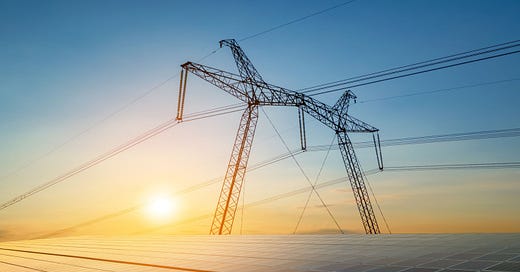Tom Talks Taxes - November 11, 2022
Are sales of electricity to a utility from a solar electric system taxable?
Millions of taxpayers have installed solar electric systems to offset electricity consumption at their residences. The federal and many state governments give incentives such as tax credits to install the systems.
The recently passed Inflation Reduction Act provides that there will be a federal tax credit for the installation of solar electric property through tax year 2034, as outlined in a prior edition of this newsletter.
After a taxpayer installs a solar electric system, the utility receives any excess electricity generated. The taxpayer gets a payment or credit from the utility in exchange for the electricity. Is this taxable income?
I doubt you will be surprised to hear that it depends on the facts and circumstances. It is also an uncertain area of law: there is no direct authority on the issue.
§61 states that gross income “means all income from whatever source derived,” while Treas. Reg. §1.61-1(a) states, “Gross income means all income from whatever source derived, unless excluded by law. Gross income includes income realized in any form, whether in money, property, or services.”
However, both the courts and the IRS have recognized that a rebate is not income but a purchase price reduction; if property is purchased, the property’s §1016 basis is reduced by the rebate amount.
In Pittsburgh Milk Co. v. Comm., 26 T.C. 707 (1956), the Tax Court held that the amount realized in selling property was reduced by the rebates paid to buyers in the transaction. However, the Court noted the following:
It does not follow, of course, that all allowances, discounts, and rebates made by a seller of property constitute adjustments to the selling prices. Terminology alone is not controlling; each type of transaction must be analyzed according to its facts and surrounding circumstances. Such examination may reveal that a particular allowance has been given for a separate consideration-as in the case of rebates made in consideration of additional purchases of specified quantity over a specified subsequent period; or as in the case of allowances made in consideration of prepayment of an account receivable, so as to be in effect a payment of interest. The test to be applied, as in the interpretation of most business transactions, is: What did the parties really intend, and for what purpose or consideration was the allowance actually made?
As an example of the above, in Rev. Rul. 76-96, the IRS ruled that rebates paid by a car manufacturer to qualifying retail customers who purchase or lease new cars or who purchase new cars and trade in a specified type of vehicle are not includible in the gross income of the customers.
Concerning credit card rewards, the IRS’s general position is that they are nontaxable rebates: “And it's a long-standing IRS policy… that card rewards are not taxable. And the rationale for that is that the reward itself acts as a discount on whatever property or services are being purchased by the consumer." See Anikeev v. Comm., T.C. Memo 2021-23.
Rev. Rul. 91-36 applies the rebate concept to utilities and energy conservation initiatives. The IRS ruled that rate reductions or nonrefundable credits received by a customer of an electric utility company who agrees to participate in energy conservation programs are not includible in the customer's gross income. The programs discussed in the guidance included those involving the purchase of specified energy-efficient products or equipment.
Based on the above, if a taxpayer receives nonrefundable credits that reduce their electric bill for providing electricity to the utility, their value is likely a nontaxable reduction in the electricity cost. How a homeowner is compensated for excess electricity production will depend on the state or utility.
Most utilities use a net metering model; in those cases, any nonrefundable credit received is likely a nontaxable rebate. In the alternative, if a taxpayer sells its produced electricity at market rates and separately purchases electricity at market rates, then the amount received is likely taxable income (as §136 would not apply), and the taxpayer may not qualify for the §25D credit. See Private Letter Ruling 201035003.
It is important to note that if a taxpayer is a net exporter of electricity and receives payment, that amount is likely income; in addition, the taxpayer will not be able to claim the full §25D credit for the solar electric property.
Share Your Thoughts!
If you are a paid subscriber, use the comments section below to discuss electricity credits from solar electric systems.
2022 Tax Update Classes
I’ll be teaching 6 CE/CPE of 2022 Tax Update (individuals and businesses) through Compass Tax Educators. Join me on the live webinars on December 8 and 15, 2022. It will be made available for on-demand CE/CPE as well after the live webinars.
I’m teaching in-person tax update classes in multiple locations in January 2023. Check out my website for locations and registration links.




